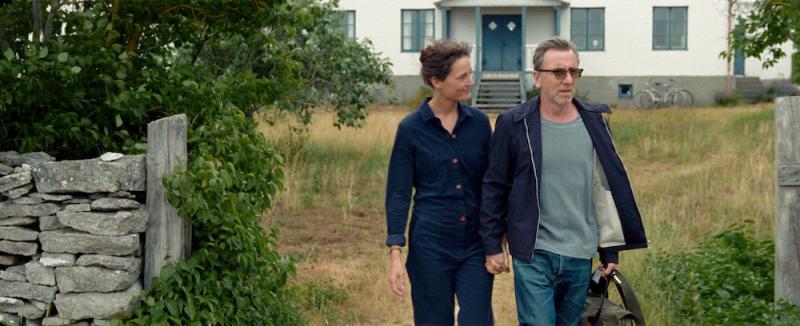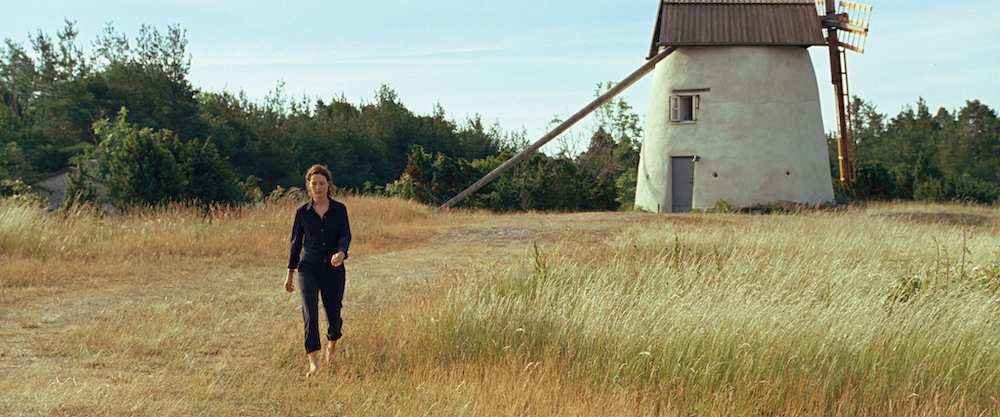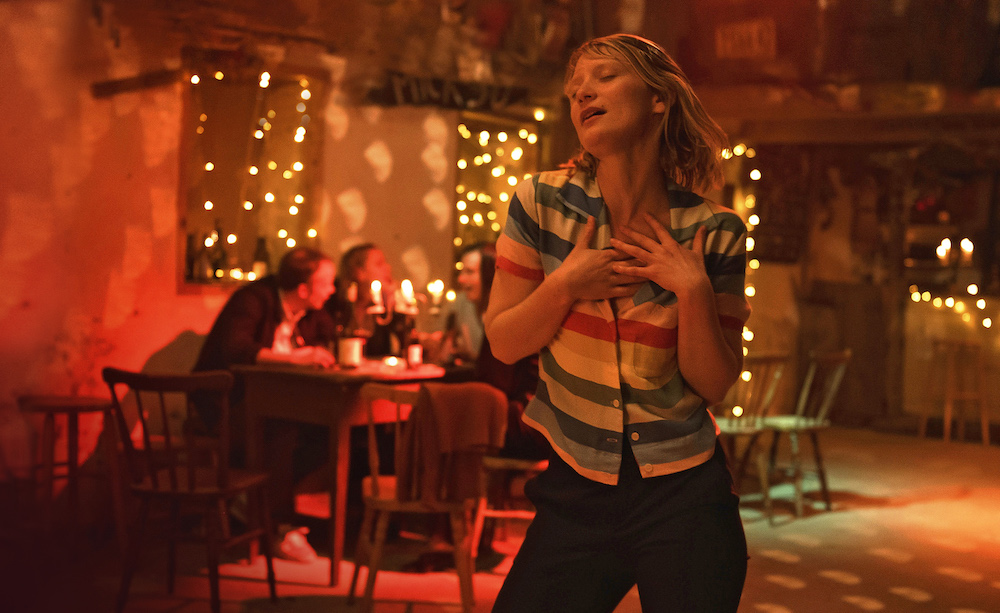Bergman Island review - Mia Hansen-Løve's joyful English-language debut | reviews, news & interviews
Bergman Island review - Mia Hansen-Løve's joyful English-language debut
Bergman Island review - Mia Hansen-Løve's joyful English-language debut
Never too meta: an intriguingly open-ended story incorporates a film within a film

French director Mia Hansen-Løve’s graceful, intriguingly open-ended seventh feature, and her English-language debut, is set on Fårö, the island that Ingmar Berman loved.
“This is your landscape, Bergman. It corresponds to your innermost imaginings of form, proportions, colours, horizons, sounds, silences, lights and reflections,” he wrote. He lived on the island for 40 years and made several films there, including Through a Glass Darkly, Persona and the TV series that inspired millions of divorces, Scenes from A Marriage.
In Bergman Island, the Swedish director is an inspirational presence, though not in an overt, reverential way – in fact one character slags him off mercilessly. Nordic seriousness is absent: this is, in many ways, a light-hearted movie, with the unusual mix of Lee Hazlewood, ABBA, and finally Tina Charles as an irresistible wedding-dance sound-track. And Denis Lenoir’s beautiful cinematography shows off those colours and horizons of Fårö, with its endless sea and sky and small settlements of houses.
But still, film-makers Chris (the wonderful Vicky Krieps; Phantom Thread) and Tony (Tim Roth) have Bergman in mind as they work on their screenplays in the idyllic – perhaps too idyllic, Chris thinks – artists’ retreat set up by the Bergman Foundation. Their relationship – they have a young daughter, who’s with her grandmother while they’re away – seems to be at some sort of crossroads, never spelled out.
 They’re staying in the bedroom used in Scenes from a Marriage, as the caretaker points out gleefully, and the elusive Chris teases Tony about sleeping in separate rooms to escape its curse. As it is, she lays claim to the mill next to the house to work in, separating herself from Tony, his copy of Strindberg’s Inferno and his notebook with its erotic drawings that she peruses dubiously while he’s out.
They’re staying in the bedroom used in Scenes from a Marriage, as the caretaker points out gleefully, and the elusive Chris teases Tony about sleeping in separate rooms to escape its curse. As it is, she lays claim to the mill next to the house to work in, separating herself from Tony, his copy of Strindberg’s Inferno and his notebook with its erotic drawings that she peruses dubiously while he’s out.
Her work seems to be at an impasse. “How can I not feel like a loser?” she complains, with Bergman’s huge body of work lurking in the background. “No one is expecting Persona,” says Tony, who’s a famous director, appearing on several panels and admired by many of the intense Bergman buffs in evidence at the retreat.
When she complains that he never tells her anything about his work, he reveals that his script is about “invisible things circulating within a couple” – which sums up, perhaps, what Hansen-Løve's film is about. They watch Cries and Whispers in Bergman’s screening room, where a chair in the front row must be kept empty: it’s Bergman’s. Solitude, agony, fear of dying: "I hope he had more fun in his life," says Chris.
And, with some foundation members, they discuss Bergman’s cruelty in life as in work. He had nine children with six different women. The mothers did everything, he did nothing, muses Chris. “I’d like to have nine kids with six different men,” she smiles. “Nice,” sighs Tony, in a long-suffering way.
When Tony gets on the bus for the Bergman Safari – an actual Fårö tourist attraction – Chris slopes off with a Stockholm film student who promises to show her places that aren’t on the safari. You expect something momentous to happen, perhaps the beginning of an affair, but no, they visit sand dunes, then swim, hurling jellyfish at each other. Chris’s fearless joie de vivre is palpable. Tony’s briefly miffed that she stood him up for the safari, but they laugh it off affectionately. There are no easy answers or clichés here.
 What Chris wants from him is advice about her project, and the second half of Bergman Island goes meta, though not in an annoyingly self-conscious way, with Chris’s screenplay, The White Dress. Suddenly we’re in new territory, or not so new at all: her film within a film is set on Fårö, starring Mia Wasikowska (pictured above) as Amy, a film-maker who’s come to the island for the wedding of a friend and also to reconnect, after many years, with her first love, Joseph (Anders Danielsen Lie). They met as teenagers; now she has a four-year-old daughter, like Tony and Chris. He has several girlfriends, she has someone else (though only one other) but there’s still an overwhelming attraction. At first, their reunion is passionate, but then Joseph goes cold on her, and it’s clear that the dynamic is uneven. She’s heart-broken again (shades of Hansen-Løve's Goodbye, First Love).
What Chris wants from him is advice about her project, and the second half of Bergman Island goes meta, though not in an annoyingly self-conscious way, with Chris’s screenplay, The White Dress. Suddenly we’re in new territory, or not so new at all: her film within a film is set on Fårö, starring Mia Wasikowska (pictured above) as Amy, a film-maker who’s come to the island for the wedding of a friend and also to reconnect, after many years, with her first love, Joseph (Anders Danielsen Lie). They met as teenagers; now she has a four-year-old daughter, like Tony and Chris. He has several girlfriends, she has someone else (though only one other) but there’s still an overwhelming attraction. At first, their reunion is passionate, but then Joseph goes cold on her, and it’s clear that the dynamic is uneven. She’s heart-broken again (shades of Hansen-Løve's Goodbye, First Love).
How this simple, compelling story relates to Chris and Tony’s relationship isn’t obvious, but what is important is the subtle way Hansen-Løve explores the nature of creativity, showing how Chris finds strength in the mirror between life and art, and how she solves her impasse without help from Tony. I love to love/but my baby just loves to dance is as good a closing comment as any to this surprisingly joyful film.
rating
Explore topics
Share this article
The future of Arts Journalism
You can stop theartsdesk.com closing!
We urgently need financing to survive. Our fundraising drive has thus far raised £49,000 but we need to reach £100,000 or we will be forced to close. Please contribute here: https://gofund.me/c3f6033d
And if you can forward this information to anyone who might assist, we’d be grateful.

Subscribe to theartsdesk.com
Thank you for continuing to read our work on theartsdesk.com. For unlimited access to every article in its entirety, including our archive of more than 15,000 pieces, we're asking for £5 per month or £40 per year. We feel it's a very good deal, and hope you do too.
To take a subscription now simply click here.
And if you're looking for that extra gift for a friend or family member, why not treat them to a theartsdesk.com gift subscription?
more Film
 Blu-ray: The Sons of Great Bear
DEFA's first 'Red Western': a revisionist take on colonial expansion
Blu-ray: The Sons of Great Bear
DEFA's first 'Red Western': a revisionist take on colonial expansion
 Spinal Tap II: The End Continues review - comedy rock band fails to revive past glories
Belated satirical sequel runs out of gas
Spinal Tap II: The End Continues review - comedy rock band fails to revive past glories
Belated satirical sequel runs out of gas
 Downton Abbey: The Grand Finale review - an attemptedly elegiac final chapter haunted by its past
Noel Coward is a welcome visitor to the insular world of the hit series
Downton Abbey: The Grand Finale review - an attemptedly elegiac final chapter haunted by its past
Noel Coward is a welcome visitor to the insular world of the hit series
 Islands review - sunshine noir serves an ace
Sam Riley is the holiday resort tennis pro in over his head
Islands review - sunshine noir serves an ace
Sam Riley is the holiday resort tennis pro in over his head
 theartsdesk Q&A: actor Sam Riley on playing a washed-up loner in the thriller 'Islands'
The actor discusses his love of self-destructive characters and the problem with fame
theartsdesk Q&A: actor Sam Riley on playing a washed-up loner in the thriller 'Islands'
The actor discusses his love of self-destructive characters and the problem with fame
 Honey Don’t! review - film noir in the bright sun
A Coen brother with a blood-simple gumshoe caper
Honey Don’t! review - film noir in the bright sun
A Coen brother with a blood-simple gumshoe caper
 The Courageous review - Ophélia Kolb excels as a single mother on the edge
Jasmin Gordon's directorial debut features strong performances but leaves too much unexplained
The Courageous review - Ophélia Kolb excels as a single mother on the edge
Jasmin Gordon's directorial debut features strong performances but leaves too much unexplained
 Blu-ray: The Graduate
Post #MeToo, can Mike Nichols' second feature still lay claim to Classic Film status?
Blu-ray: The Graduate
Post #MeToo, can Mike Nichols' second feature still lay claim to Classic Film status?
 Little Trouble Girls review - masterful debut breathes new life into a girl's sexual awakening
Urska Dukic's study of a confused Catholic teenager is exquisitely realised
Little Trouble Girls review - masterful debut breathes new life into a girl's sexual awakening
Urska Dukic's study of a confused Catholic teenager is exquisitely realised
 Young Mothers review - the Dardennes explore teenage motherhood in compelling drama
Life after birth: five young mothers in Liège struggle to provide for their babies
Young Mothers review - the Dardennes explore teenage motherhood in compelling drama
Life after birth: five young mothers in Liège struggle to provide for their babies
 Blu-ray: Finis Terrae
Bleak but compelling semi-documentary, filmed on location in Brittany
Blu-ray: Finis Terrae
Bleak but compelling semi-documentary, filmed on location in Brittany
 Oslo Stories Trilogy: Sex review - sexual identity slips, hurts and heals
A quietly visionary series concludes with two chimney sweeps' awkward sexual liberation
Oslo Stories Trilogy: Sex review - sexual identity slips, hurts and heals
A quietly visionary series concludes with two chimney sweeps' awkward sexual liberation

Add comment